Filenews 14 December 2024- by Theodora Nicolaou
One of the mildest years tends to be this year in relation to immigration. The downward trend in both the numbers of arrivals and new asylum applications, as well as the decrease in the pending cases before the Asylum Service, show that the measures taken by the Government and the newly established Deputy Ministry of Migration have begun to bear fruit.
The zero arrivals of irregular migrants by sea since last May have brought about a noticeable decrease in new asylum applications, which for this year stand at 6548. This is a record, as it is the lowest in seven years.
At the same time, returns reached 9143, thus further opening the gap between returns and arrivals, which by the end of November stood at 5912.
The situation is considered -for now- manageable, but the challenges and risks remain as our region continues to be in an unstable situation.
89,808 asylum applications in 10 years
According to data from the Asylum Service, which were provided to "F" by the Deputy Ministry of Migration and International Protection, new asylum seekers in the last decade (2015 – 2024) amounted to 89,808.
Specifically, in 2015 there were 2105 new asylum applications, in 2016 another 2845 were made, in 2017 an increase began to be observed after reaching 4458, while in 2018 they skyrocketed to 7617.
Since then, there has been a sharp increase, with the exception of 2020 when there was a decrease in applications attributed to the effects of the coronavirus pandemic. New asylum applications in 2019 reached 12724, in 2020 there were 7094 new applications, while in 2021 another 13235 were made. 2022 was the record year for Cyprus, with 21565 people applying for asylum.
In 2023, there was an apparent decrease in new asylum applications, with them amounting to 11617, recording a decrease of 46% compared to 2022.
This year (until the end of November) 6548 people applied for asylum. This is a record, as it is the lowest in seven years.
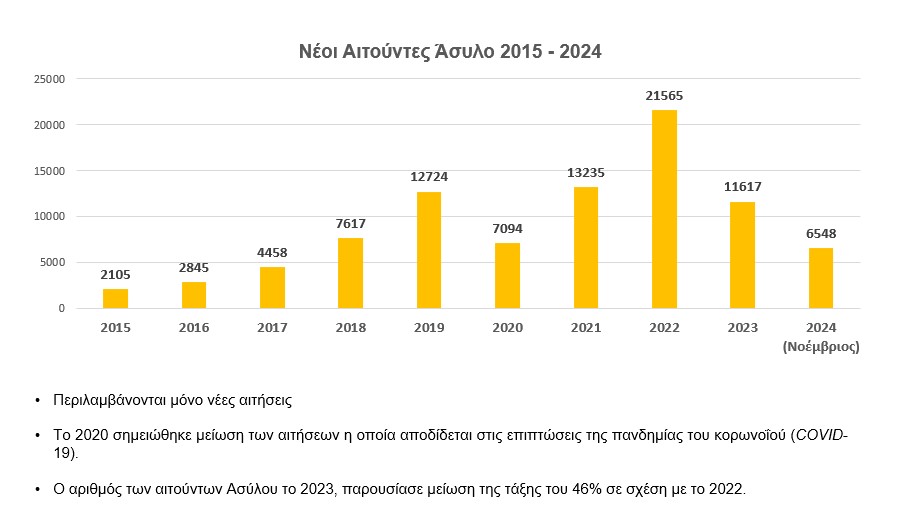
In fact, if we compare the period January – November 2024 with the corresponding periods of the previous two years, it appears that between 2022 and 2024, applicants decreased by 68%. In the reporting period in 2022, 20258 applications were made and in 2023 they decreased to 10594.
With illegal entry most
Most asylum seekers arrive in Cyprus illegally. Indicatively, in 2021, 2453 asylum seekers entered the Republic of Cyprus legally and another 10782 illegally. In 2022, a year in which a record number of new applications was recorded, only 2308 applicants arrived legally in Cyprus, while another 19257 arrived illegally. The legal route to reach Cyprus was chosen by only 1039 asylum seekers in 2023 and 323 so far in 2024, while 10578 applicants arrived illegally last year and 6225 this year.
Sharp decrease in new applications since May
A sharp decrease has been recorded in new asylum applications since last May, a month after the government decided to put the examination of Syrian asylum applications on ice. Specifically, while in January there were 976 new applications, in February another 799, in March 1142 and in April 1527, we observe that in May only 279 applications were made. In the following months the numbers remained at the same level (168 in June, 190 in July, 265 in August, 298 in September), while the last two months saw a slight increase with 500 new applicants in October and 396 in November.
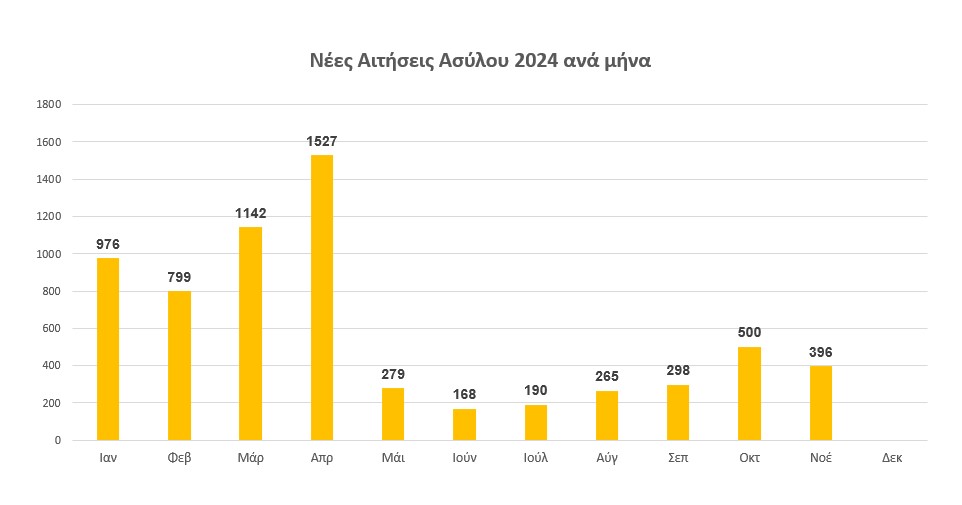
Zero arrivals by sea
This sharp decrease in new applications coincides in time and can be attributed to the fact that since last May arrivals by sea remain zero. The data show that the increased patrols at sea and the cooperation developed by the Republic of Cyprus (RoC) with the Lebanese authorities are bearing fruit.
Indicatively, we should mention that in January irregular arrivals by sea amounted to 462 and through the green line to 316, in February by sea 711 people arrived and from the occupied areas another 316, in March 827 migrants arrived by boat and 350 from the occupied areas and in April arrivals by sea amounted to 862 and through the green line to 261. Since then, no arrivals by sea have been recorded, only across the Green Line. In the last seven months, 1807 immigrants crossed into the free areas from the occupied areas.
According to data from the Deputy Ministry of Migration, in 2024 (until 30/11) a total of 5912 irregular migrants arrived at the RoC, of which 3050 came to the free areas from the occupied areas through the green line and 2862 arrived on the Cypriot coast by sea.
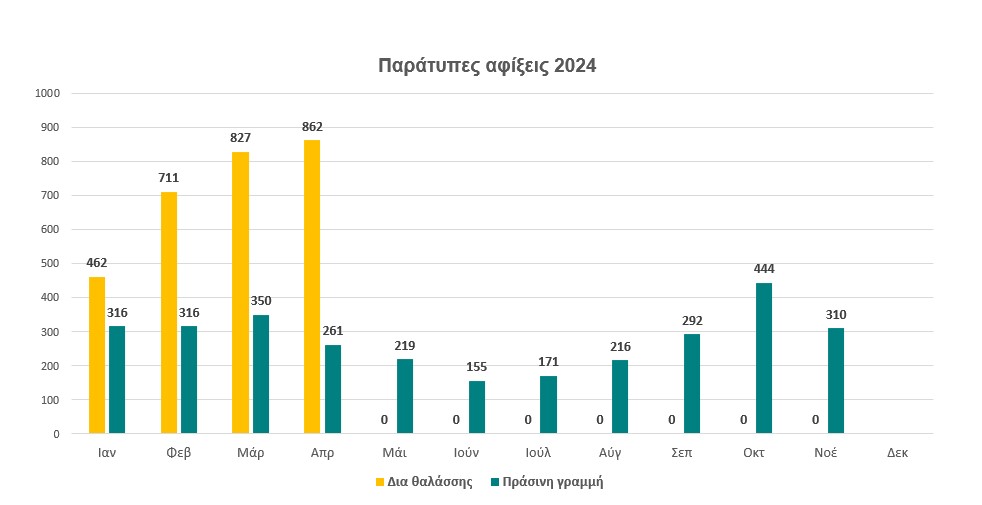
Top ten countries of origin of young asylum seekers
The majority of asylum applications registered this year were made by Syrians. Of the total 6548 new applicants, 4176 were of Syrian origin, 385 are from Afghanistan, 333 from Somalia, 330 from Iran, 180 from Nigeria, 164 from the Democratic Republic of Congo, 157 from Sudan, 91 from Palestine, 69 from Iran, 67 from Cameroon and another 596 come from other countries.
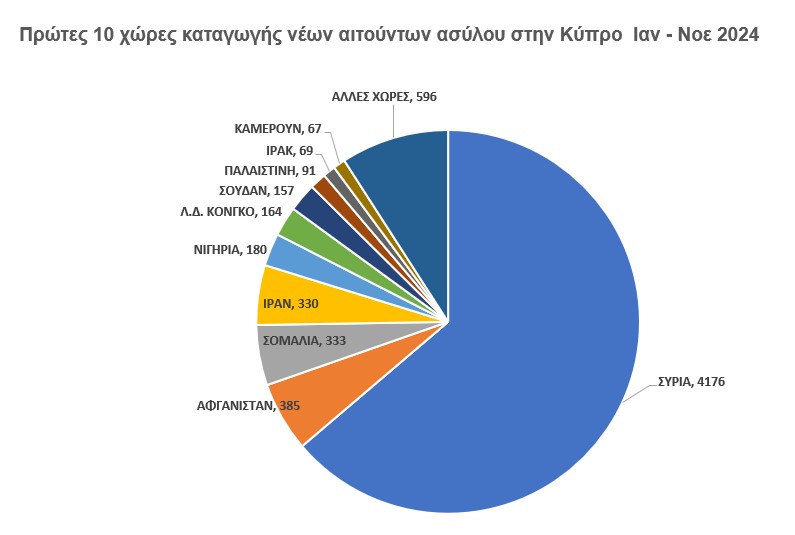
Therefore, Syrians continue to be the first country of origin in asylum applications, but with significantly reduced new applications, it is also noteworthy that a sharp decrease was recorded in applicants coming from African countries such as Nigeria, DR Congo, and Afghanistan.
This is evident from the comparison of November 2024 with those in 2022 and 2023. In November 2022, out of a total of 1910 applications, 318 were made by Syrians, 292 by Afghans, 245 by Nigerians and 234 by DR Congo. Last November, out of 1418 filed, 1125 were of Syrian origin, while from Afghanistan, Nigeria and DR Congo the applicants amounted to only 39, 31 and 29 respectively. A similar scene was observed this year, with the difference that Syrian new asylum seekers were far fewer than last year, with only 131 new applications made. There were 45 applications from Afghans, while Nigeria and DR Congo are now not included in the top five countries of origin for the month in question.
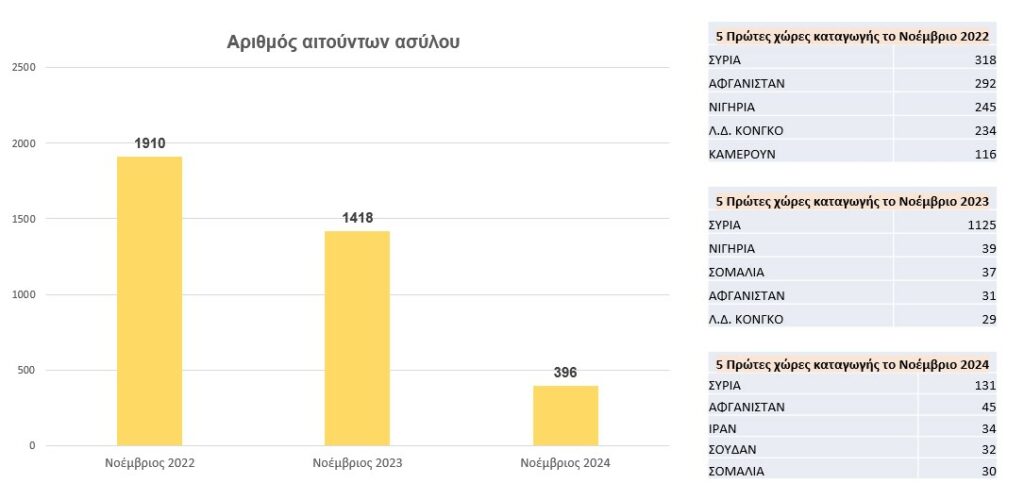
9143 returns
According to data from the return office, in 2024 (until 30/11), a total of 9143 returns were recorded, thus further opening the gap between returns and arrivals. In the same period this year, 775 relocations of migrants took place through the EU Solidarity Mechanism.
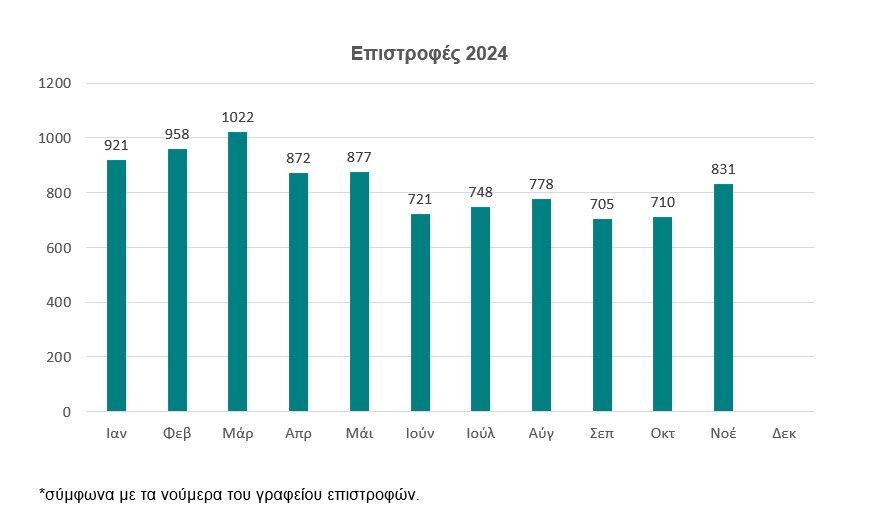
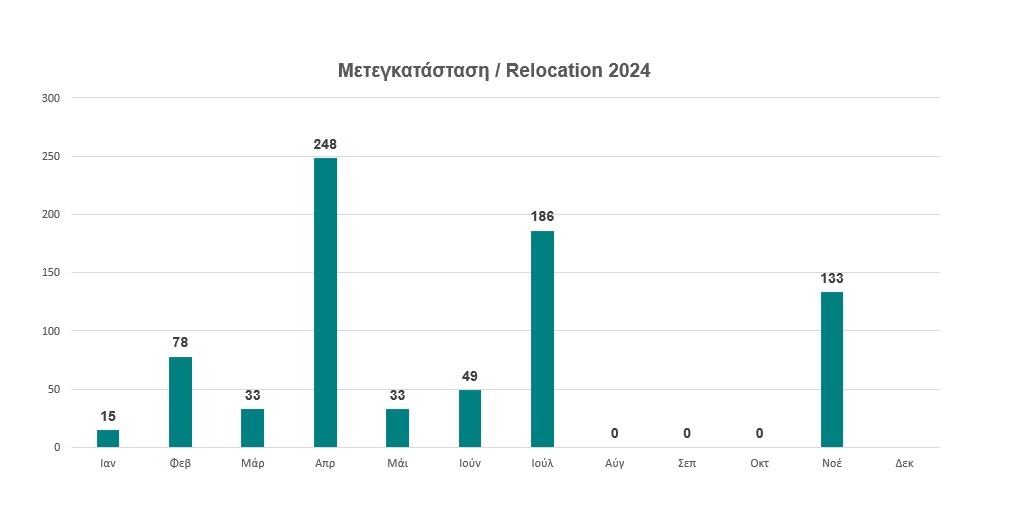
21237 cases pending
Regarding the pending cases of applications for international protection, they currently amount to 21237, while at the beginning of the year the Asylum Service had before it 26365 cases. The decline has been gradual, but has started to be achieved more noticeably since last June. Specifically, 24725 cases were pending in May, 23934 in June, 22932 in July, 22408, 21816 in September and 21517 in October.
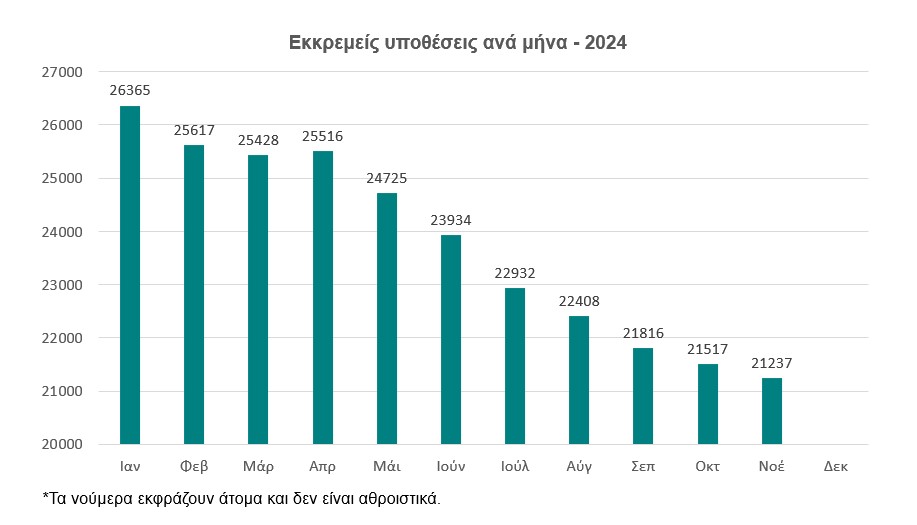
Out of a total of 21237 cases pending before the Asylum Service, 14201 concern Syrians. The rest are as follows: 1969 concern applicants of DRC origin, 1283 Afghans, 574 Iranians, 509 Somalis, 447 Cameroonians, 304 Nigerians, 286 from Guinea, 261 from Iraq, 165 Turks, 137 Palestinians, 132 from Sudan, 100 from Sierra Leone, 88 Ukrainians, 86 Russians and 695 from other countries.
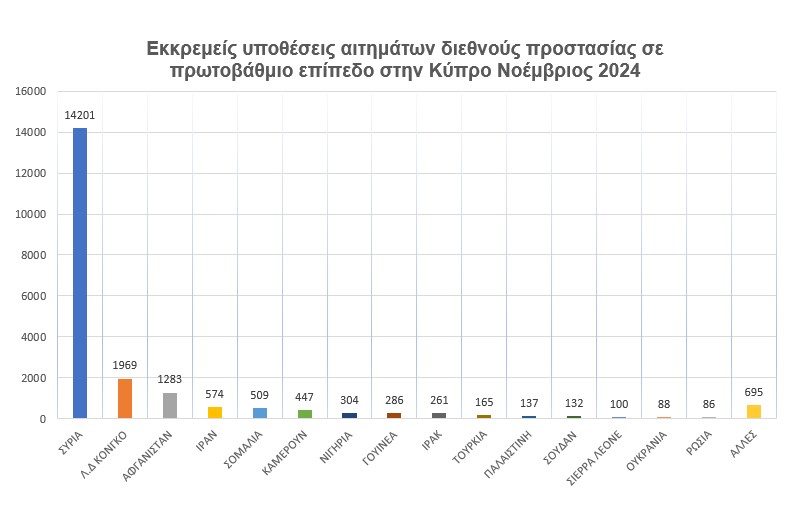
5888 rejection decisions
In 2024, the Asylum Service took a total of 14937 decisions, of which 5888 concerned rejections and 3728 granted international protection status (of which 2437 concern supplementary protection and 1291 refugee status).
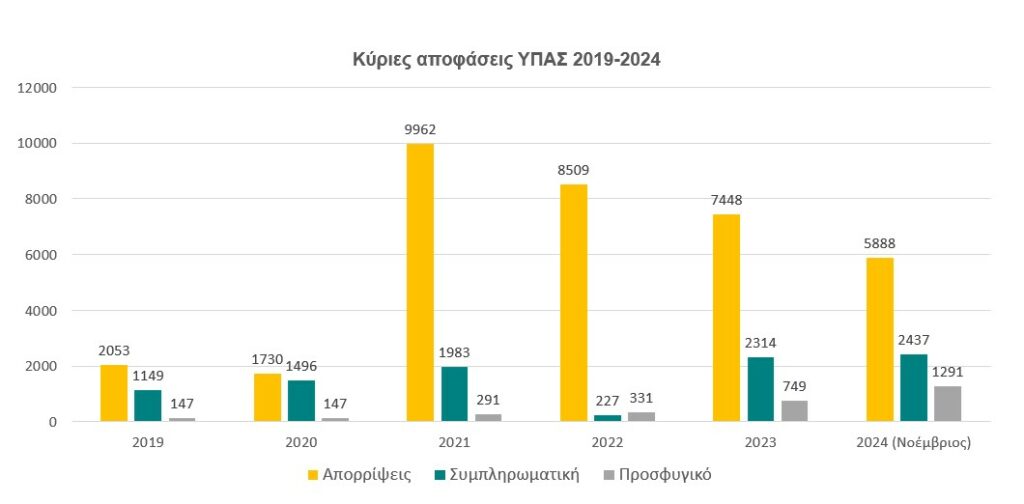
The year with the most rejections of applications was 2021 with 9962 rejections. In 2022, 8509 cases were rejected and in 2023 we had 7448 rejections.
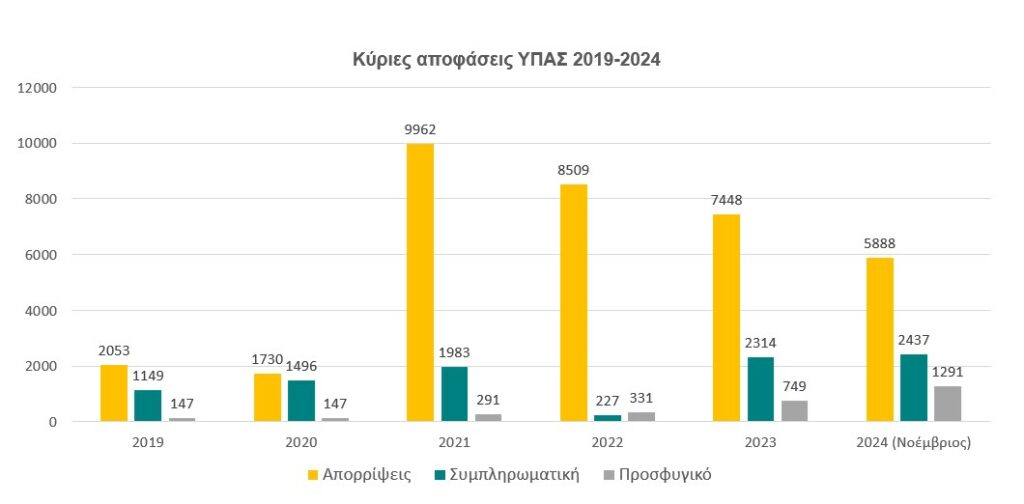
129 Syrians demand to return home
At the same time, developments in Syria with the fall of the Assad regime have given rise to a desire for many to return to their homeland.
In recent days, a number of Syrians residing in Cyprus have withdrawn their applications for international protection, while others have renounced their subsidiary protection status as they intend to return to Syria.
According to the latest data obtained by "F", from Monday until yesterday there have been a total of 129 withdrawals of asylum applications and resignations of subsidiary protection status.
The Deputy Ministry of Migration, as stated by the competent Deputy Minister Nikolas Ioannidis, is taking all necessary measures to facilitate voluntary returns.
